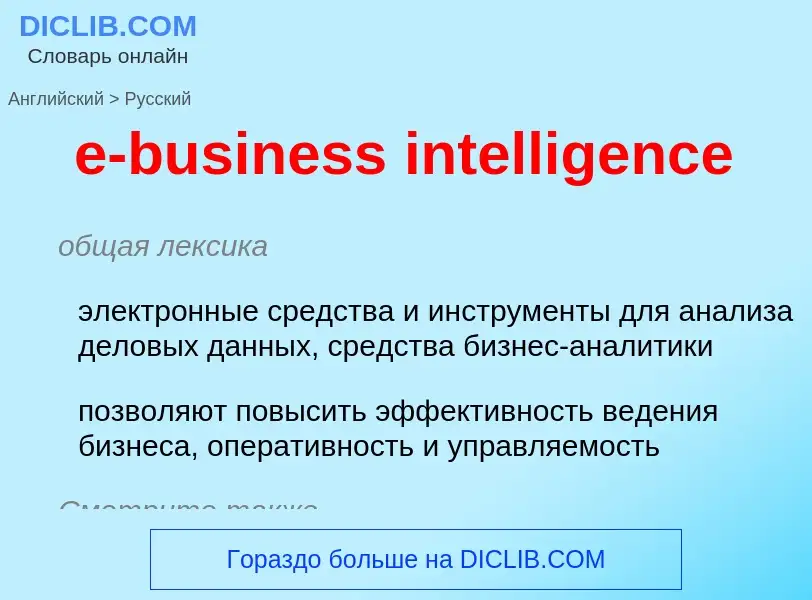Traduzione e analisi delle parole tramite l'intelligenza artificiale ChatGPT
In questa pagina puoi ottenere un'analisi dettagliata di una parola o frase, prodotta utilizzando la migliore tecnologia di intelligenza artificiale fino ad oggi:
- come viene usata la parola
- frequenza di utilizzo
- è usato più spesso nel discorso orale o scritto
- opzioni di traduzione delle parole
- esempi di utilizzo (varie frasi con traduzione)
- etimologia
e-business intelligence - traduzione in russo
общая лексика
электронные средства и инструменты для анализа деловых данных, средства бизнес-аналитики
позволяют повысить эффективность ведения бизнеса, оперативность и управляемость
Смотрите также
общая лексика
электронный бизнес, э-бизнес
под электронным бизнесом понимаются все формы электронной бизнес-деятельности. Примерами являются электронная коммерция или торговля (e-commerce или e-trade), в том числе использующая мобильные средства коммуникации (m-commerce), электронный консалтинг (e-consulting), электронное издательство (e-publishing house) и т.п.
Definizione
1.
Wikipedia
Business intelligence (BI) comprises the strategies and technologies used by enterprises for the data analysis and management of business information. Common functions of business intelligence technologies include reporting, online analytical processing, analytics, dashboard development, data mining, process mining, complex event processing, business performance management, benchmarking, text mining, predictive analytics, and prescriptive analytics.
BI tools can handle large amounts of structured and sometimes unstructured data to help identify, develop, and otherwise create new strategic business opportunities. They aim to allow for the easy interpretation of these big data. Identifying new opportunities and implementing an effective strategy based on insights can provide businesses with a competitive market advantage and long-term stability, and help them take strategic decisions.
Business intelligence can be used by enterprises to support a wide range of business decisions ranging from operational to strategic. Basic operating decisions include product positioning or pricing. Strategic business decisions involve priorities, goals, and directions at the broadest level. In all cases, BI is most effective when it combines data derived from the market in which a company operates (external data) with data from company sources internal to the business such as financial and operations data (internal data). When combined, external and internal data can provide a complete picture which, in effect, creates an "intelligence" that cannot be derived from any singular set of data.
Among myriad uses, business intelligence tools empower organizations to gain insight into new markets, to assess demand and suitability of products and services for different market segments, and to gauge the impact of marketing efforts.
BI applications use data gathered from a data warehouse (DW) or from a data mart, and the concepts of BI and DW combine as "BI/DW" or as "BIDW". A data warehouse contains a copy of analytical data that facilitates decision support.

